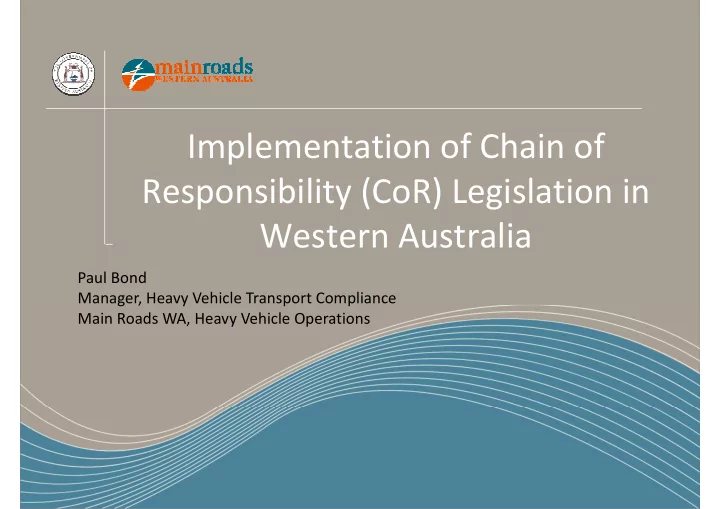

Implementation of Chain of Responsibility (CoR) Legislation in Western Australia Paul Bond Manager, Heavy Vehicle Transport Compliance Main Roads WA, Heavy Vehicle Operations
Legislation
Chain of Responsibility – What is it? CoR legislation extends the legal liability for breaches of transport law to all parties throughout the transport chain.
Chain of Responsibility – What does (CoR) mean? If you use road transport as part of your business, you share the responsibility of preventing breaches under new CoR legislation. This means anyone who has control in the transport chain (including the operator and manager) can be held legally accountable if, by their actions, inactions or demands, they cause or contribute to road safety breaches.
Chain of Responsibility – What vehicle types does this reform cover? • In WA CoR laws will apply to all vehicle types, (including light vehicles <4.5 tonne).
Chain of Responsibility – What type of offences does it cover? In WA CoR laws WILL ONLY extend to vehicle mass, dimension & load restraint breaches. Not under CoR but don’t forget …….. � Fatigue (Worksafe) � Speeding � Drugs & Alcohol & Health
Chain of Responsibility – Possible Breaches…
Chain of Responsibility – Load Restraint Guide
Chain of Responsibility – Has CoR law commenced in WA? • No. • The CoR law is scheduled for commencement once the drafting of the supporting regulations has been finalised. • This period will enable affected parties to become familiar with the new CoR requirements and provide time to modify business practices (if required).
Chain of Responsibility – Where can I find the CoR legislation? • Road Traffic (Administration) Act 2008 http://www.slp.wa.gov.au/legislation/statutes.nsf/main_mrtitle_4471_homepa ge.html • Road Traffic (Vehicles) Act 2012 http://www.slp.wa.gov.au/legislation/statutes.nsf/main_mrtitle_12926_homep age.html
Areas of Specific Coverage
Chain of Responsibility – Who is included in the Chain? If you are involved in any of the following road transport activities, you are a party in the ‘Chain of Responsibility’ and may be deemed liable in the event of a breach of the road laws: Consigning : a person or company commissioning the carrying of goods; Packing : placing goods in packages, containers or pallets; Loading : placing or restraining the load of the vehicle; Driving : the physical act of driving a vehicle; Operating : operating a business which controls the use of a vehicle; Receiving : paying for the goods / taking possession of the load.
Chain of Responsibility – Also extends to… Partners in a Director(s) of managed a body partnership corporate Unincorporated associations Employers Any person who threatens, intimidates, coerces, induces or offers an incentive to another person to commit an offence
Chain of Responsibility – Who influences the Chain?
Chain of Responsibility – What influences vehicle compliance? Scheduling Travel Vehicle delays capability Staff Loading demands practices Customer Competitive demands pressure
Compliance and Enforcement
Chain of Responsibility – Enforcement Main Roads are the key enforcement agency via: � Transport Inspectors; � Intelligence Unit; � Dedicated Investigators. WA Police will also have the authority to enforce CoR.
Chain of Responsibility – What may prompt an investigation? � Number (and type) of offences detected over a defined period of time � Fatal or serious crashes � Complaints � Informants � Intelligence
Chain of Responsibility – What you need to do? Whichever activity you perform in the ‘chain’, it is important that you take reasonable steps to manage the risk and ensure road safety is not compromised. There are no limits to the ways in which you can do this. What constitutes reasonable steps will vary according to each individual’s circumstances.
Chain of Responsibility – What is ‘reasonable steps’ defence? Must Prove: � Did not know of the breach, and � Could not be reasonably expected to have known, and � Took all reasonable steps to prevent the breach
Chain of Responsibility – How do you take ‘reasonable steps’? Taking reasonable steps means you must: � regularly identify and assess the risks associated with your activities; and � manage those risks. You can manage those risks by: � doing all you can to eliminate the risk; or � if you can’t - do everything you can to reduce or minimise the likelihood of the risk occurring. Doing nothing is not an option
Chain of Responsibility – What is ‘reasonable’? Things to consider: � Nature of transport task � Expertise / experience / training � Risk management approaches � Policies � Procedures � Monitoring / auditing
Chain of Responsibility – How do you take ‘reasonable steps’? Taking reasonable steps could include : � reviewing business practices, � changing commercial arrangements, � adopting a risk management approach, � appropriate training policies, � appropriate supervision, � ensuring responsibilities are known
Chain of Responsibility – Questions for you to consider? � Have you taken all reasonable steps to comply with the CoR legislation? � Are you loading your vehicles correctly? � Are you satisfied that your contractors are able to take the loads they say they can, legally ?
Actions and Consequences
Recommend
More recommend